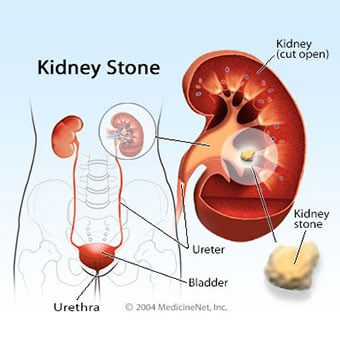Turinys
Inkstų akmenys (inkstų akmenys)
Šios inkstų akmenys, commonly called ” inkstų akmenys Are hard crystals that form in the kidneys and can cause severe pain. Doctors use the term urolitiazė to designate these crystals, which can also be found in the rest of the urinary system: in the bladder, urethra or ureters (see diagram).
In almost 90% of cases, šlapimo akmenys form inside a kidney. Their size is very variable, ranging from a few millimeters to several centimeters in diameter. Most of them (80%) are eliminated spontaneously by passing through the various ducts of the urinary system and cause few symptoms. However, the ureters, located between the kidneys and the bladder, are very small ducts. A stone formed in the kidney, which is in transit to the bladder, can easily obstruct a ureter and thus cause aštrūs skausmai. Tai vadinama inkstų diegliai.
Ką tai liečia?
Kidney stones are very common, and their prevalence appears to have increased over the past 30 years. Between 5% and 10% of people will experience an attack of renal colic during their lifetime. Kidney stones occur more frequently in the karantinas. They are twice as common invyrai than in women. Some children can also be affected.
More than half of people who have already had a calculus will have it again within 10 years of the first attack. The pasikeitimas. todėl yra labai svarbus.
Priežastys
The calculations are the result of kristalizacija of mineral salts and acids present in too high concentration in the urine. The process is the same as that observed in water containing a lot of mineralinės druskos : beyond a certain concentration, the salts start to crystallize.
Kidney stones can be the result of a number of factors. Most often, they are due to a lack of dilution of the urine, that is to say to a too low water consumption. An unbalanced diet, too rich in sugar or protein, can also be to blame. In many cases, however, we do not find a specific cause that could explain the formation of stones.
More rarely, an infection, certain medications, a genetic (such as cystic fibrosis or hyperoxaluria) or metabolic disease (such as diabetes) can lead to the formation of urinary stones. Likewise, urinary tract malformations can be involved, especially in children.
Types of calculations
The chemical composition of the stone depends on the cause, but the majority of kidney stones contain kalcis. Urine tests and an analysis of the stones recovered allow their composition to be known.
Calcium-based calculations. They account for about 80% of all kidney stones. They include calculations based on calcium oxalate (the most common), calcium phosphate or a mixture of the two. They are caused by dehydration, too much vitamin D, certain diseases and medications, hereditary factors or a diet too rich in oxalate (see Diet in the Prevention section).
Struvite calculations (or ammonia-magnesian phosphate). They are linked to chronic or recurrent urinary tract infections of bacterial origin and represent approximately 10% of cases.1. Unlike other types of stones, they are more common in women than in men. Often, they form in people who have a bladder catheter.
Uric acid calculations. They represent 5 to 10% of kidney stones. They are formed due to an abnormally high concentration of uric acid in the urine. People with gout or who receive chemotherapy are more likely to have it. They can also be caused by an infection.
Cistino akmenys. This form is the rarest. In all cases, their formation is attributable to the cistinurija, a genetic defect that causes the kidneys to excrete too much cystine (an amino acid). This type of calculation can occur as early as childhood.
Galimos komplikacijos
Complications are rather rare if the stones are well cared for. However, it may happen that in addition to one obstrukcija of a ureter by a calculation, a infekcija settles down. This can lead to a blood infection (sepsis) which will require reagavimo į ekstremalias situacijas. Another situation which can become serious is when a person having onlyone kidney has renal colic.
Svarbi. The health risks associated with kidney stones are great; it is very important to be properly monitored by a doctor. |










